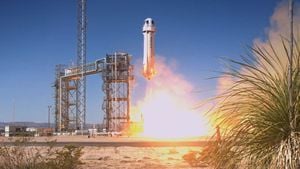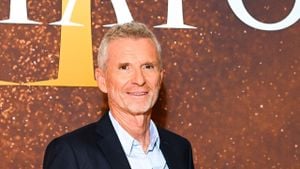Sinn Féin leader Mary Lou McDonald and Northern Ireland First Minister Michelle O'Neill will not attend this year's St. Patrick's Day events in Washington, D.C., marking a noteworthy boycott driven by political principles.
The absence of these prominent Irish leaders is fueled by their discontent with President Donald Trump's recent statements surrounding the Israel-Palestine conflict, particularly calls for the mass displacement of Palestinians from Gaza. For McDonald, the situation on the ground has been deeply concerning, and she expressed horror over Trump's remarks, which she described as "a fundamental breach of international law" and as "dangerous departures from the U.N. position of peace and security for both Palestinians and Israelis."
"I have listened in horror to calls from the President of the United States for the mass expulsion of the Palestinian people from their homes and the permanent seizure of Palestinian lands," McDonald stated. This principled decision to boycott the traditional events reflects not only their sentiment but also mirrors the long-standing support of the Irish for Palestinian independence; many draw parallels between their own historical struggles and the plight of the Palestinian people.
O’Neill echoed this sentiment, asserting, "We have all witnessed the heartbreak and devastation and the suffering in Palestine, and the recent comments by the U.S. president around the mass expulsion of the Palestinian people from Gaza [{ ]} is something which I cannot ignore." She emphasized the importance of standing on the "side of humanity" and reinforced her commitment to maintaining diplomatic relations with the U.S. Despite her absence, she pledged to continue engaging politically and economically to advocate for positive change.
While Irish leaders are sitting out this significant cultural event, Irish Prime Minister Micheál Martin will still attend, bringing with him the opportunity to reflect the Irish people's views. He remarked, "Sinn Féin does what it always does – it engages in politics. I have a responsibility to the country." This suggests his willingness to navigate the complex web of international relations, even amid dissatisfaction expressed by fellow leaders.
The Democratic Unionist Party (DUP) has responded critically to the boycott. DUP leader Gavin Robinson described it as "reckless" and "short-sighted," stressing the necessity of maintaining strong ties with the United States, particularly during uncertain times. "Turning away from [the U.S. relationship] at a time when we need continued international support is a reckless move," stated Robinson. With the U.S. being integral to Northern Ireland's economic framework, the DUP is concerned about the ramifications of such diplomatic distancing.
The backdrop of these criticisms is steeped in history. Ireland has consistently shown support for Palestinian rights, and this stance was more pronounced during recent conflicts. Many Irish citizens view their solidarity as part of recognizing historical injustices faced by their own nation during British rule. The Irish government has long been vocal about advocating for Palestinian statehood and continuing to press for peace in the region.
Commenting on their traditional gatherings, the Irish government spokesperson highlighted, "Ireland and the U.S. have deep and strong bilateral relations, built on rich foundations of ancestral ties and close economic, diplomatic, and political links." With trade relations highly significant—estimated at over one trillion euros—both parties benefit from the established cordial collaborations.
Saint Patrick’s Day has evolved beyond mere cultural celebration for the Irish diaspora; it also embodies the cultivation of political and economic relationships, particularly with the U.S. Previous administrations have utilized this event to discuss important matters, including negotiations related to peace processes such as the Good Friday Agreement.
The U.S. remains home to the largest Irish diaspora, underlining just how significant these relations are. While McDonald and O’Neill’s boycott may stand as a protest, it also reflects the enduring ties and concerns shared between nations. Both leaders call for discussions on issues of humanitarian law and the fate of the Palestinian people as part of their commitment to justice and equity.
With the backdrop of global turmoil and complex political dynamics, the actions of McDonald and O’Neill resonate beyond mere attendance; they serve as poignant commentary on the role of leadership and the moral responsibilities it entails. The outcome for diplomatic relations may remain uncertain, yet the message from Irish leaders is clear—they prioritize principled stances over traditional politics, showcasing the nuances of international friendships.



